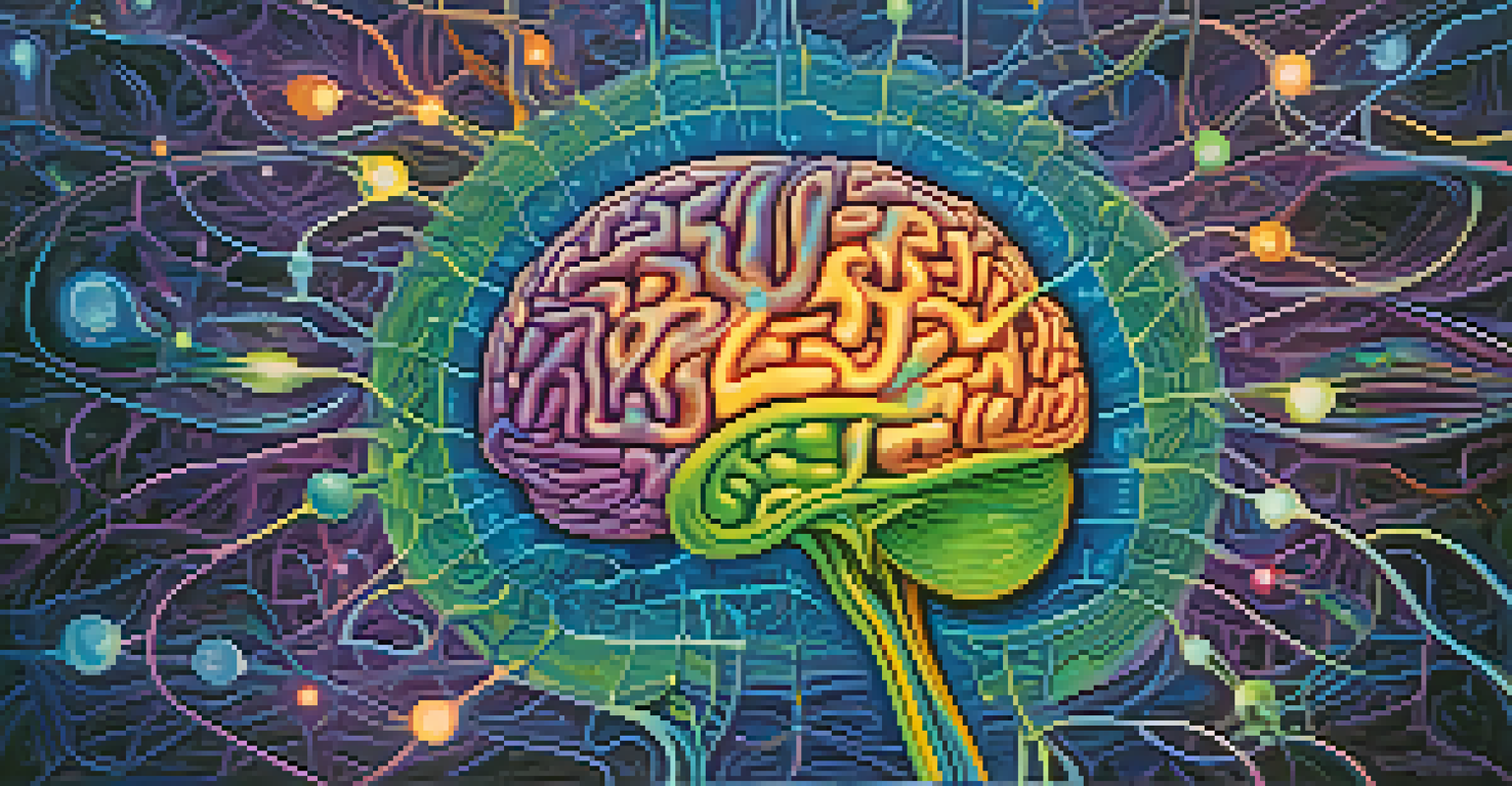Psychedelics and Mental Health: Global Research Initiatives

Understanding Psychedelics and Their Effects
Psychedelics are substances that alter perception, mood, and cognitive processes. Common examples include psilocybin, LSD, and MDMA. These compounds have been used for centuries, often in traditional and spiritual contexts, but modern research is now exploring their potential for therapeutic use.
Psychedelics are to the mind what a telescope is to the eye.
Recent studies suggest that psychedelics can help alleviate symptoms of mental health disorders such as depression, anxiety, and PTSD. This renewed interest has sparked a wave of scientific inquiry into how these substances interact with the brain. By understanding their mechanisms, researchers aim to unlock new treatment options for those struggling with mental health issues.
While the effects of psychedelics can vary widely among individuals, the promise they hold for mental health treatment is becoming increasingly clear. As more people share their experiences and studies continue, the conversation around psychedelics is evolving toward a more informed and nuanced understanding.
The Rise of Clinical Trials and Research Studies
In recent years, there's been a significant increase in clinical trials exploring the therapeutic potential of psychedelics. Institutions like Johns Hopkins University and Imperial College London are leading the charge, conducting rigorous research to assess the efficacy of these substances. This surge in studies reflects a growing acceptance of psychedelics in the scientific community.

These trials often focus on specific mental health conditions, using psychedelics in conjunction with psychotherapy. For instance, studies on psilocybin for depression have shown promising results, leading to a deeper investigation into its long-term effects. As more trials are completed, the body of evidence supporting the benefits of psychedelics continues to grow.
Psychedelics Show Mental Health Promise
Research indicates that psychedelics like psilocybin and LSD may effectively alleviate symptoms of mental health disorders such as depression and PTSD.
Furthermore, regulatory bodies are beginning to take notice. In some regions, there have been moves to decriminalize or even legalize certain psychedelics for therapeutic use, reflecting a shift in public perception and policy. This trend indicates that the future may hold more accessible treatment options for those in need.
Global Perspectives on Psychedelic Research
Psychedelic research is not limited to one region; it has become a global endeavor. Countries like Canada, Australia, and Brazil are also conducting studies and exploring the therapeutic potential of these substances. This international collaboration allows for a more diverse understanding of how psychedelics can be utilized in varying cultural contexts.
The greatest discovery of my generation is that human beings can alter their lives by altering their attitudes of mind.
Each region brings its unique approach to research and regulation, impacting how studies are designed and conducted. For instance, while some countries are moving towards legalizing psychedelics for therapeutic use, others remain cautious and focused on strictly controlled clinical trials. This diversity can enhance the overall understanding of psychedelics and their implications for mental health.
Moreover, global initiatives are fostering collaboration among researchers, facilitating the sharing of data and findings. As researchers from different backgrounds come together, they can learn from each other's experiences, potentially speeding up the development of effective treatments for mental health conditions.
Challenges and Ethical Considerations in Research
While the potential benefits of psychedelics are exciting, there are also ethical considerations that researchers must navigate. Issues such as informed consent, the potential for misuse, and the psychological safety of participants are paramount. Ensuring that studies are conducted responsibly is crucial for the integrity of the research.
Furthermore, the stigma surrounding psychedelics can pose challenges for researchers and participants alike. Many individuals may be hesitant to engage in studies due to societal perceptions of these substances. Addressing this stigma through education and positive discourse is essential for advancing research and fostering an open dialogue about psychedelics.
Growing Global Research Collaboration
Countries worldwide are increasingly engaged in psychedelic research, fostering diverse approaches and enhancing understanding of their therapeutic potential.
As the field evolves, researchers are working to develop guidelines that prioritize participant safety and ethical standards. Balancing innovation with responsibility will be key to ensuring that the potential of psychedelics is harnessed effectively and safely.
The Role of Psychotherapy in Psychedelic Treatment
One of the most intriguing aspects of psychedelic research is the role of psychotherapy in enhancing treatment outcomes. Many studies suggest that combining psychedelics with therapeutic support can significantly improve results, particularly in treating trauma and emotional distress. This integrative approach emphasizes the importance of understanding the psychological context in which psychedelics are used.
Therapists often guide participants through their experiences, helping them process emotions and insights that arise during sessions. This supportive environment can foster a deeper connection to the therapeutic process, allowing individuals to confront and work through difficult feelings. The synergy between psychedelics and psychotherapy may be a key component in achieving lasting mental health benefits.
As research progresses, there is growing interest in training therapists specifically for psychedelic-assisted therapy. Developing a skilled workforce that understands both the therapeutic and psychedelic aspects can enhance the effectiveness of the treatment, ensuring that individuals receive comprehensive care tailored to their unique needs.
Psychedelics and Their Potential for Widespread Use
With the promising results emerging from research, many are beginning to consider the potential for psychedelics to be integrated into mainstream mental health treatment. If proven effective, these substances could offer new hope for individuals who have not found relief through traditional therapies. This possibility raises questions about accessibility and the future of mental health care.
However, widespread use necessitates careful consideration regarding regulation and education. Ensuring that these substances are used safely and effectively will require robust guidelines and ongoing research. Public education campaigns will also be vital in informing individuals about the benefits and risks associated with psychedelics.
Ethics and Safety in Psychedelic Trials
As psychedelic research expands, addressing ethical considerations and participant safety remains crucial to ensure responsible and effective study outcomes.
As the conversation around mental health continues to evolve, the integration of psychedelics into treatment paradigms could represent a significant shift. It will be essential to approach this potential with an open mind while remaining grounded in scientific evidence and ethical practices.
Looking Ahead: Future Directions in Psychedelic Research
The future of psychedelic research appears bright, with ongoing studies and emerging insights shaping the landscape of mental health treatment. Researchers are exploring new compounds, dosing strategies, and combinations with other therapeutic modalities. As we expand our understanding of psychedelics, the potential applications in mental health care may become even more diverse.
Moreover, the growing acceptance of psychedelics in both the scientific community and public discourse is paving the way for additional research initiatives. As barriers to funding and legal restrictions begin to diminish, more innovative studies can be conducted. This could ultimately lead to breakthroughs in treatments for various mental health disorders.

As we look to the future, fostering a collaborative and ethical research environment will be crucial. By prioritizing safety, participant welfare, and scientific integrity, we can ensure that the exploration of psychedelics continues to yield valuable insights and effective treatments for those in need.